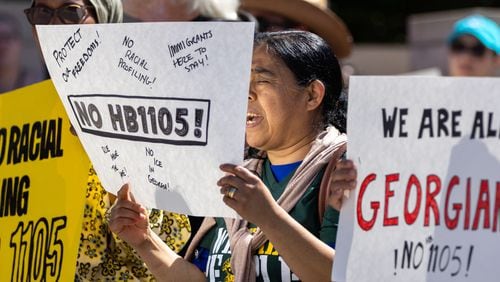In mid-March, the appearance of police checkpoints on the streets of Athens sent shockwaves of fear through that city’s immigrant population. People warned one another of the checkpoints’ locations on social media. Local community advocates helped coordinate rides for undocumented residents who needed to get to work or to doctor appointments — and who could have suffered significant consequences if they were caught driving without a license.
Roughly a month earlier, Athens had been at the center of a national political firestorm after a nursing student was found dead on the campus of the University of Georgia. The man arrested in her killing was a Venezuelan national who authorities say entered the country unlawfully.
Concern over policing among immigrant communities has only grown with time. Last week Georgia Gov. Brian Kemp signed into law a bill that mandates closer collaboration between local law enforcement and federal immigration officials. While they wait to see how the bill will be enforced, some immigrant rights’ advocates are rolling out initiatives to make immigrants feel safer and avoid encounters with police that could lead to deportation. At Asian Americans Advancing Justice-Atlanta, a nonprofit legal group, staff have created a free Uber rides program.
“We wanted to take part in helping people get from place to place because of the uptick of police stops and safety checks that were being put everywhere in local Athens,” said Berenice Rodriguez, civic engagement and organizing director at AAAJA.
“We also wanted to do something that could help alleviate some of the high anxiety and high pressure” that unlicensed immigrants feel when they get behind the wheel of a car.
‘Not a forever solution’
Proponents of the new Georgia immigration law, House Bill 1105, say it will improve public safety.
HB 1105 requires jailers to hold anyone suspected of being in the U.S. without authorization if that person is wanted by U.S. Immigration and Customs Enforcement. Sheriffs who fail to notify federal immigration agents once they identify someone who may be in the country illegally face potential sanctions.
“If you enter our country illegally and proceed to commit further crimes in our communities, we will not allow your crimes to go unanswered,” Kemp said ahead of signing the bill.
In past eras of more intense immigration enforcement across Georgia and in metro Atlanta, driving without a license was an offense that frequently resulted in undocumented immigrants being detained and handed over to ICE.
Advocates say a return to that reality would put undocumented community members in the uncomfortable position of risking deportation every time they drive to work or to pick up children at school.
To neutralize that risk, AAAJA worked with state lawmakers this legislative cycle to introduce legislation that would allow immigrant Georgia residents without legal status to apply for drivers’ licenses in the state, but those efforts proved unsuccessful.
Licenses for undocumented immigrants “is something that many other states have passed, and especially given Georgia’s limited public transportation infrastructure, it’d be something that would really benefit a lot of people,” said Thông Phan, senior policy associate at AAAJA.
AAAJA sees its free Uber rides program as a Band-Aid solution to bring immigrant residents peace of mind while the full scope of HB1105′s enforcement comes to light.
According to Rodriguez, AAAJA burned through $1,000 in Uber coupons during the first 10 days of its free rides program, with most beneficiaries requesting transportation to go to work or to the grocery store.
“It’s not a forever solution,” Rodriguez said. “We will run out of money eventually.”
The Atlanta Journal-Constitution and Report for America are partnering to add more journalists to cover topics important to our community. Please help us fund this important work here.
About the Author







